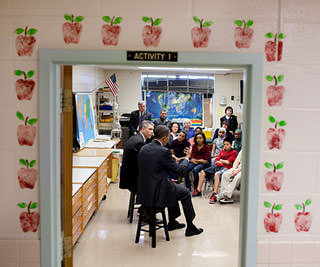Beware of Arne Duncan’s Tricks
The statistical evidence is that smaller class size means better education, but smaller class size also means higher taxes. So Education Secretary Arne Duncan chose trickery to divert parents from the clear road.
The statistical evidence is that smaller class size means better education, but smaller class size also means higher taxes. So Education Secretary Arne Duncan chose trickery to divert parents from the clear road.
At a recent meeting of governors in Washington he suggested that they pay bonuses to the best teachers if they agree to increase their class size. Duncan would prefer to put his own school-age children in a classroom with 28 students led by a “fantastic teacher” rather than in one with 23 and a “mediocre” teacher, he said.
But what parent wouldn’t? If large class size becomes the sign of a good teacher, no doubt all parents will insist that their child be placed in the largest class that a school has to offer. Unable to fit all students in just one class, however, principals will declare all teachers fantastic and assign large classes to all.
And the beauty of it is that the demand for large classes will come from the parents themselves. Clever, huh?
(For a discussion of the statistical evidence, go to the chapter “You Can’t Throw Money at Education” in my book, “Economics for the Rest of Us” pp. 97-106.)
Moshe Adler teaches economics at Columbia University and at the Harry Van Arsdale Center for Labor Studies at Empire State College.
Dig, Root, GrowThis year, we’re all on shaky ground, and the need for independent journalism has never been greater. A new administration is openly attacking free press — and the stakes couldn’t be higher.
Your support is more than a donation. It helps us dig deeper into hidden truths, root out corruption and misinformation, and grow an informed, resilient community.
Independent journalism like Truthdig doesn't just report the news — it helps cultivate a better future.
Your tax-deductible gift powers fearless reporting and uncompromising analysis. Together, we can protect democracy and expose the stories that must be told.
This spring, stand with our journalists.
Dig. Root. Grow. Cultivate a better future.
Donate today.








You need to be a supporter to comment.
There are currently no responses to this article.
Be the first to respond.